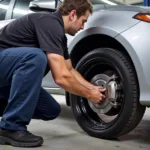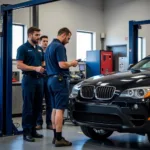A full car service is much more than just an oil change. It’s a comprehensive check-up designed to keep your vehicle running smoothly, safely, and efficiently. Understanding what a full car service entails can save you money in the long run by preventing costly repairs down the road. Let’s dive into the specifics of what you can expect during a full car service.
What’s Included in a Full Car Service?
A full car service covers a wide range of checks and replacements, ensuring nearly every aspect of your vehicle’s health is addressed. This extensive service typically includes an interim service plus several additional checks and procedures. Here’s a detailed breakdown:
Engine and Components
- Oil and Filter Change: Old oil is drained and replaced with fresh oil, along with a new filter, ensuring proper lubrication and preventing engine wear.
- Spark Plug Inspection/Replacement: Worn spark plugs can reduce fuel efficiency and engine performance. They’re inspected and replaced if necessary.
- Air Filter Replacement: A clean air filter ensures the engine receives a sufficient supply of clean air, crucial for optimal combustion.
- Fuel Filter Check: The fuel filter prevents contaminants from entering the fuel system. It’s checked for blockages and replaced if needed.
Fluid Levels and Condition
- Coolant Check: The coolant level is checked and topped off if necessary. The coolant’s condition is also assessed, ensuring it’s protecting the engine from overheating.
- Brake Fluid Check: Brake fluid is essential for safe braking. The level and condition are checked, and the fluid is replaced if it’s contaminated or low.
- Power Steering Fluid Check: Power steering fluid ensures smooth and responsive steering. The level is checked and topped off as needed.
- Transmission Fluid Check (Automatic Transmission): The transmission fluid level and condition are checked to maintain smooth gear changes and prevent transmission problems.
Other Essential Checks
- Tire Condition and Pressure: Tires are inspected for wear and tear, proper inflation, and any damage. Correct tire pressure ensures optimal fuel efficiency and handling.
- Brake Inspection: Brakes are thoroughly checked for wear and tear, including brake pads, rotors, and calipers.
- Steering and Suspension Check: The steering and suspension system is inspected for any signs of damage or wear, ensuring proper handling and ride comfort.
- Lights and Electrical System Check: All lights, including headlights, taillights, brake lights, and indicators, are checked to ensure they’re functioning correctly. The battery and charging system are also inspected.
- Exhaust System Check: The exhaust system is checked for leaks, damage, and proper functioning. A faulty exhaust system can lead to reduced performance and increased emissions.
- Wiper Blades Check: Wiper blades are checked for wear and tear and replaced if necessary to ensure clear visibility in adverse weather conditions.
You might be interested in learning more about specific services like what Halfords offer. You can find out more at do halfords service cars. Also, if you’re curious about the details of a full-service car wash, you can check out what does car wash full service with vacium. Understanding what’s included in different service packages can help you make informed decisions about your vehicle’s maintenance. For a deeper understanding of car servicing, you can visit what does servicing a car entail.
Why is a Full Car Service Important?
Regular full car services are essential for maintaining the health, safety, and longevity of your vehicle. By addressing potential issues early on, you can avoid costly repairs and ensure your car runs efficiently. A well-maintained car is also safer to drive, giving you peace of mind on the road.
How Often Should You Get a Full Car Service?
The recommended frequency for a full car service varies depending on the make and model of your vehicle and your driving habits. Generally, a full service is recommended every 12,000 miles or 12 months, whichever comes first. Refer to your owner’s manual for specific recommendations for your vehicle.
If you’re wondering about A/C service, check out this resource: does you car a c service include refrigerant. Also, understanding service contracts can be crucial when buying a new car. You can learn more about them here: what is a service contract when buying a car.
Conclusion
Understanding what does a full car service entail empowers you to make informed decisions about your vehicle’s maintenance. By investing in regular full car services, you’re not just maintaining your car; you’re investing in its longevity, safety, and your peace of mind.
FAQ
- What’s the difference between a full service and an interim service?
- How long does a full car service take?
- How much does a full car service cost?
- Can I perform a full car service myself?
- What should I look for when choosing a car service center?
- What are the benefits of regular car servicing?
- How do I know if my car needs a full service?
Need assistance? Reach out to us via WhatsApp: +1(641)206-8880, Email: [email protected] or visit us at 456 Oak Avenue, Miami, FL 33101, USA. Our customer service team is available 24/7.


